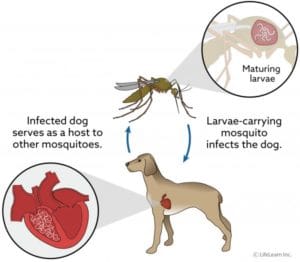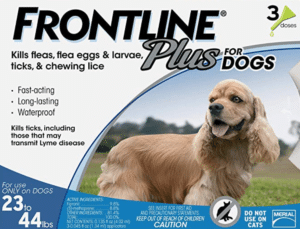Few things in life are as exciting or rewarding as welcoming a new puppy into the family. They’re adorable, they’re loving, they’re funny – and they’re also counting on you to help protect them from parasites and diseases. Here’s a quick look at common and preventable parasites and diseases and how you can start heartworm prevention.
Heartworm Disease Transmission
Heartworms are transmitted by mosquitos, and the worms live in the heart and lungs of the dog. 
Worms: Worth Worrying About
Intestinal parasites, including roundworms and hookworms, can cause serious problems in puppies. Roundworms are commonly diagnosed in puppies and may infect 90% of puppies under three months of age.6 Intestinal parasites cause more severe disease in young puppies. Clinical signs include failure to gain weight, poor hair and coat, and vomiting. Some puppies may even die from roundworm infection. Hookworms are another intestinal parasite commonly seen in puppies. Infected puppies may develop diarrhea, anemia due to blood loss, and fail to gain weight. Hookworm infection can also result in death. Ask your veterinarian about proper deworming protocols for puppies. You can reduce the risk of exposure to these intestinal parasites by avoiding potentially contaminated environments and promptly removing feces from the yard or other public areas. Ask your veterinarian about placing your dog on a heartworm preventive that is labeled for the treatment and control of roundworms and hookworms.
How Do Dogs Get Heartworms?
Can People Get Heartworms From Their Dogs?
It can only be passed on by mosquitoes. It’s a specific parasite that only affects dogs and cats and ferrets and other mammals. In rare cases, heartworms have infected people, but it does not complete its life cycle. The heartworm will migrate to the lung and cause around lesion that looks like a tumor. But these are very rare cases.
Heartworm Prevention
If One of My Dogs Has Heartworms, Can He Give it to My Other Dogs?
No. Again, the only way heartworms are transmitted is through the bite of an infected mosquito. And even if an uninfected mosquito bit your infected dog, and then bit your uninfected dog the same night, he wouldn’t transmit the parasite from one dog to the other. That’s because when a mosquito bites an infected animal, the heartworm needs to undergo an incubation period in the mosquito before the mosquito can infect other animals.
How to Prevent Heartworms?
There are many products for heartworm prevention in your canine pals. Frontline
is a great option.
- 1. www.heartwormsociety.org/article.asp?id=48#epidemiology. Slide 5. Accessed May 31, 2019.
- 2. Vital statistics for your veterinary practice. In: Landeck E, ed. The Veterinary FeeReference. 6th ed. Lakewood, CO:AAHA Press, 2009;57, 58, 200, 213, 226, 265, 333.
- 4. www.heartwormsociety.org/veterinary-resources/canine-guidelines.html. Accessed May 31, 2019.
- 5. CAPC Recommendations. http://www.capcvet.org/recommendations/ascarids.html.Accessed May 31, 2019.)
- 6. Schantz PM. Zoonotic ascarids and hookworms: the role for veterinarians inpreventing human disease. In: Emerging Vector-Borne and Zoonotic Disease,The Compendium Suppl 2002;24(1):47-52.












